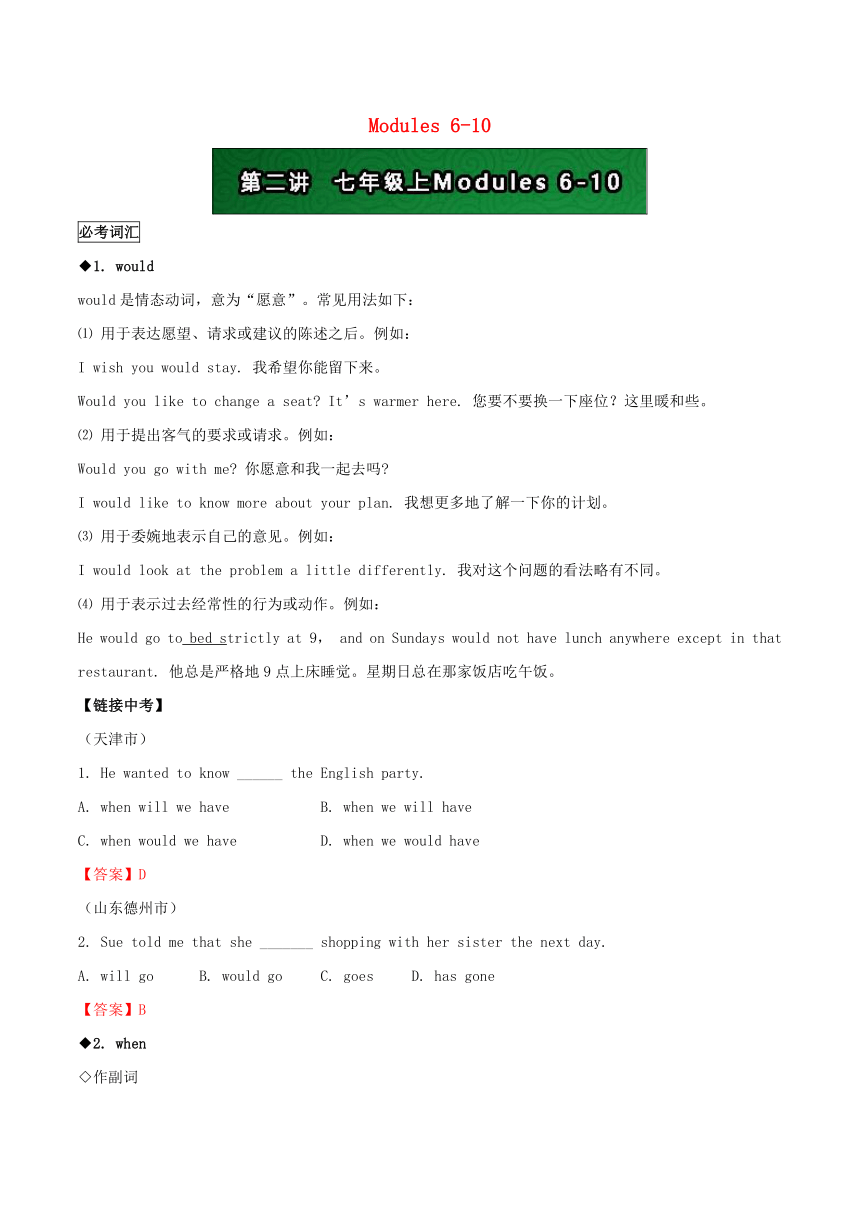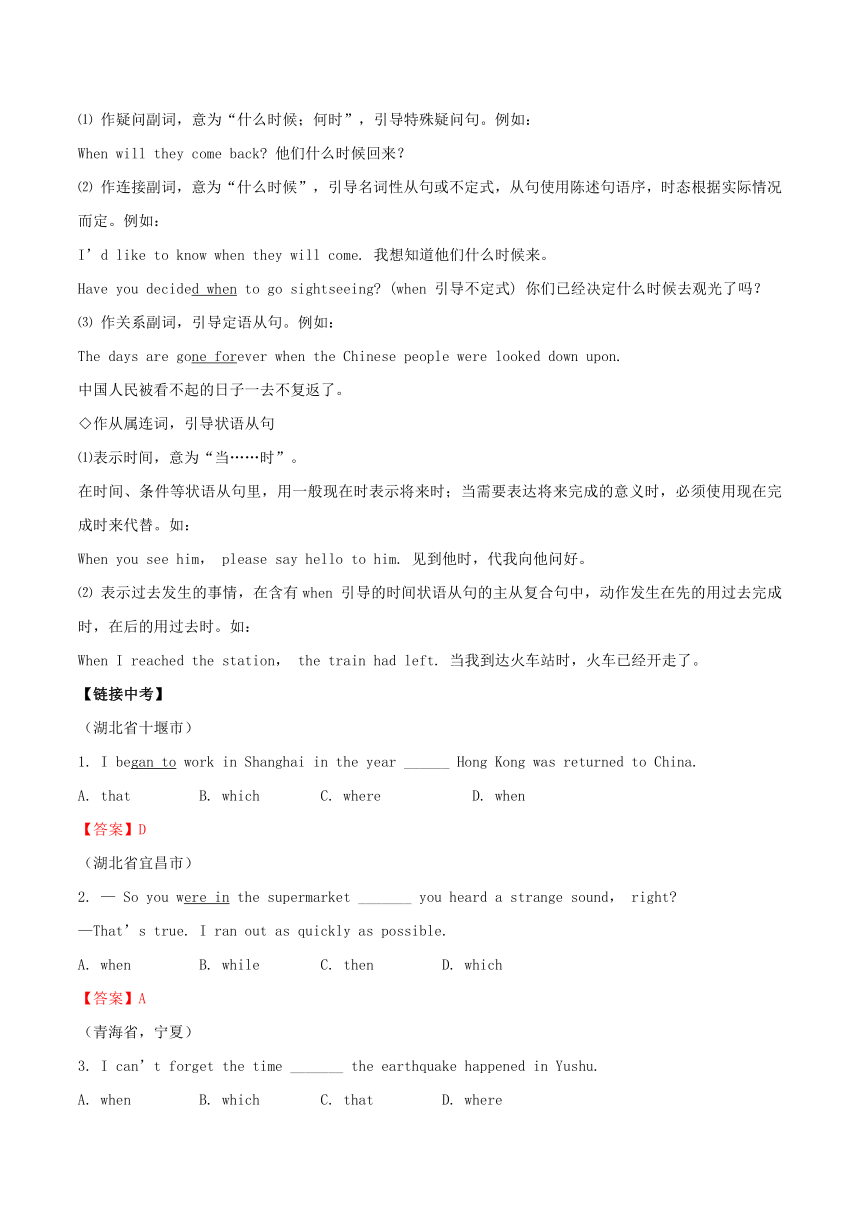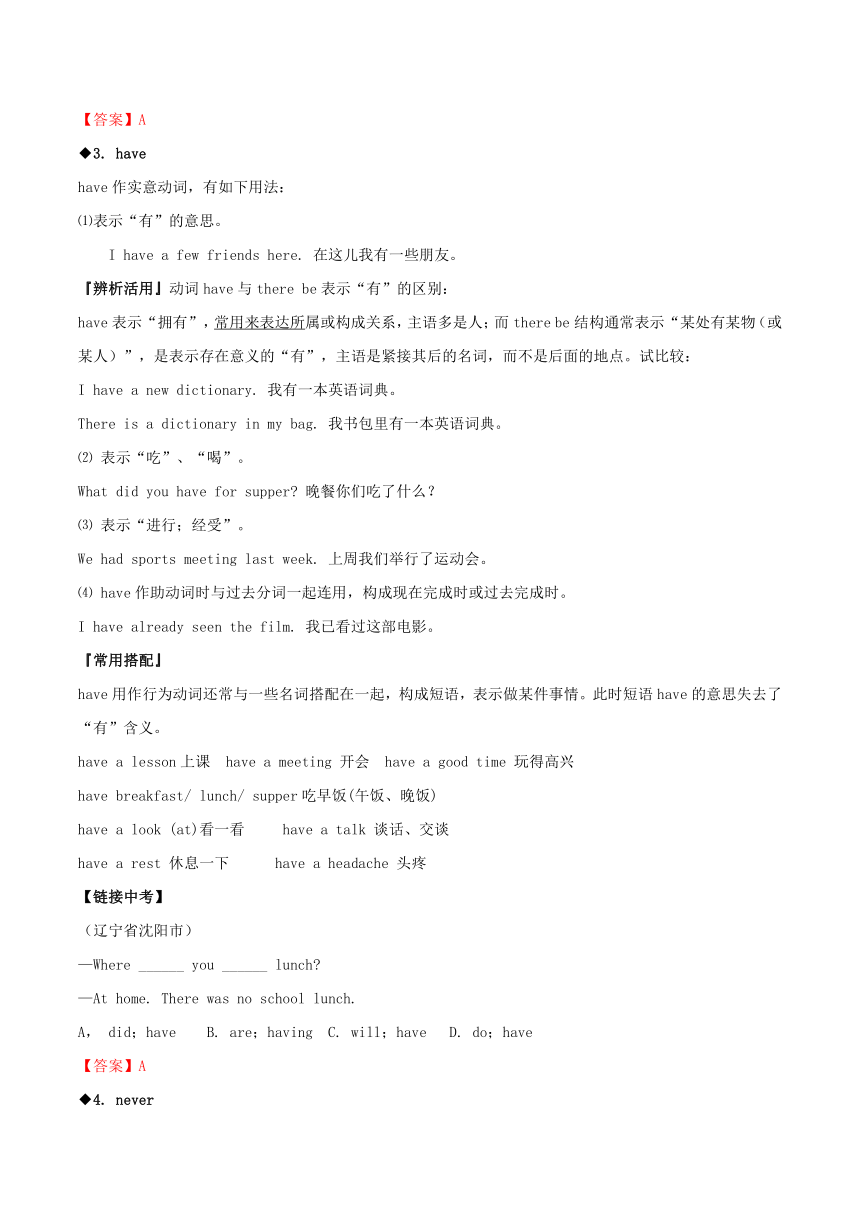外研版中考英语总复习(上册)第二篇 课本要点梳理 第二讲 七上 Modules 6-10
文档属性
| 名称 | 外研版中考英语总复习(上册)第二篇 课本要点梳理 第二讲 七上 Modules 6-10 |  | |
| 格式 | zip | ||
| 文件大小 | 31.9KB | ||
| 资源类型 | 教案 | ||
| 版本资源 | 外研版 | ||
| 科目 | 英语 | ||
| 更新时间 | 2016-08-26 06:58:34 | ||
图片预览



文档简介
Modules
6-10
必考词汇
◆1.
would
would是情态动词,意为“愿意”。常见用法如下:
⑴
用于表达愿望、请求或建议的陈述之后。例如:
I
wish
you
would
stay.
我希望你能留下来。
Would
you
like
to
change
a
seat
It’s
warmer
here.
您要不要换一下座位?这里暖和些。
⑵
用于提出客气的要求或请求。例如:
Would
you
go
with
me
你愿意和我一起去吗
I
would
like
to
know
more
about
your
plan.
我想更多地了解一下你的计划。
⑶
用于委婉地表示自己的意见。例如:
I
would
look
at
the
problem
a
little
differently.
我对这个问题的看法略有不同。
⑷
用于表示过去经常性的行为或动作。例如:
He
would
go
to
bed
s
( http: / / www.21cnjy.com )trictly
at
9,
and
on
Sundays
would
not
have
lunch
anywhere
except
in
that
restaurant.
他总是严格地9点上床睡觉。星期日总在那家饭店吃午饭。
【链接中考】
(天津市)
1.
He
wanted
to
know
______
the
English
party.
A.
when
will
we
have
B.
when
we
will
have
C.
when
would
we
have
D.
when
we
would
have
【答案】D
(山东德州市)
2.
Sue
told
me
that
she
_______
shopping
with
her
sister
the
next
day.
A.
will
go
B.
would
go
C.
goes
D.
has
gone
【答案】B
◆2.
when
◇作副词
⑴
作疑问副词,意为“什么时候;何时”,引导特殊疑问句。例如:
When
will
they
come
back
他们什么时候回来?
⑵
作连接副词,意为“什么时候”,引导名词性从句或不定式,从句使用陈述句语序,时态根据实际情况而定。例如:
I’d
like
to
know
when
they
will
come.
我想知道他们什么时候来。
Have
you
decided
when
( http: / / www.21cnjy.com )
to
go
sightseeing
(when
引导不定式)
你们已经决定什么时候去观光了吗?
⑶
作关系副词,引导定语从句。例如:
The
days
are
gone
for
( http: / / www.21cnjy.com )ever
when
the
Chinese
people
were
looked
down
upon.
中国人民被看不起的日子一去不复返了。
◇作从属连词,引导状语从句
⑴表示时间,意为“当……时”。
在时间、条件等状语从句里,用一般现在时表示将来时;当需要表达将来完成的意义时,必须使用现在完成时来代替。如:
When
you
see
him,
please
say
hello
to
him.
见到他时,代我向他问好。
⑵
表示过去发生的事情,在含有when
引导的时间状语从句的主从复合句中,动作发生在先的用过去完成时,在后的用过去时。如:
When
I
reached
the
station,
the
train
had
left.
当我到达火车站时,火车已经开走了。
【链接中考】
(湖北省十堰市)
1.
I
began
to
( http: / / www.21cnjy.com )
work
in
Shanghai
in
the
year
______
Hong
Kong
was
returned
to
China.
A.
that
B.
which
C.
where
D.
when
【答案】D
(湖北省宜昌市)
2.
—
So
you
were
in
( http: / / www.21cnjy.com )
the
supermarket
_______
you
heard
a
strange
sound,
right
—That’s
true.
I
ran
out
as
quickly
as
possible.
A.
when
B.
while
C.
then
D.
which
【答案】A
(青海省,宁夏)
3.
I
can’t
forget
the
time
_______
the
earthquake
happened
in
Yushu.
A.
when
B.
which
C.
that
D.
where
【答案】A
◆3.
have
have作实意动词,有如下用法:
⑴表示“有”的意思。
I
have
a
few
friends
here.
在这儿我有一些朋友。
『辨析活用』动词have与there
be表示“有”的区别:
have表示“拥有”,常用来表达所
( http: / / www.21cnjy.com )属或构成关系,主语多是人;而there
be结构通常表示“某处有某物(或某人)”,是表示存在意义的“有”,主语是紧接其后的名词,而不是后面的地点。试比较:
I
have
a
new
dictionary.
我有一本英语词典。
There
is
a
dictionary
in
my
bag.
我书包里有一本英语词典。
⑵
表示“吃”、“喝”。
What
did
you
have
for
supper
晚餐你们吃了什么?
⑶
表示“进行;经受”。
We
had
sports
meeting
last
week.
上周我们举行了运动会。
⑷
have作助动词时与过去分词一起连用,构成现在完成时或过去完成时。
I
have
already
seen
the
film.
我已看过这部电影。
『常用搭配』
have用作行为动词还常与一些名词搭配在一起,构成短语,表示做某件事情。此时短语have的意思失去了“有”含义。
have
a
lesson上课 have
a
meeting
开会 have
a
good
time
玩得高兴
have
breakfast/
lunch/
supper吃早饭(午饭、晚饭)
have
a
look
(at)看一看
have
a
talk
谈话、交谈
have
a
rest
休息一下 have
a
headache
头疼
【链接中考】
(辽宁省沈阳市)
—Where
______
you
______
lunch
—At
home.
There
was
no
school
lunch.
A,
did;have
B.
are;having
C.
will;have
D.
do;have
【答案】A
◆4.
never
never是副词,意为“从未;永不;决不”。主要与肯定动词连用而不与否定动词连用,在各句中的位置和not相同。例如:
I
have
never
done
that
before.
我从未做过那个。
He
will
never
go
there
again.
他再也不会去那里了。
当never谓语句首予强调时,句中主、谓语也采用倒装词序。例如:
Never
in
my
life
have
I
seen
such
a
plant.
我生平从来没有见过这样的工厂。
『常用搭配』
Never
mind.
没关系。
【拓展】Never
mind口语的常见用法。
⑴
表示安慰,意为“别着急;不要紧;没关系。”例如:
Never
mind,
next
time
I’m
sure
you
can
do
better.
没关系,我相信你下次一定会做得好些。
⑵
用来回答道歉,意为“没关系;没什么。”例如:
—Sorry
to
have
kept
you
waiting.
对不起,让你久等了。
—Never
mind.
没关系。
【链接中考】
(江苏省苏州市)
1.
I
can
______
be
a
nurse.
I’m
not
a
very
patient
person.
A.
seldom
B.
ever
C.
never
D.
always
【答案】C
(山东省潍坊市)
2.
—
Sorry,
sir.
I
made
a
mistake
again.
—______
Practice
more
and
you
will
do
better.
A.
Never
mind.
B
( http: / / www.21cnjy.com ).
I’m
not
sure.
C.
You’re
welcome
D.
Don’t
mention
it
【答案】A
常考短语
◆1.
What
about…
What
about.
.
.
=How
( http: / / www.21cnjy.com )about.
.
.
意为“(你认为)……怎么样?”常用于征求意见、询问情况或提出建议。后接名词、代词或动名词。
What
about
a
glass
of
milk?来一杯牛奶怎么样?
What
about
going
out
for
a
walk?出去散步怎么样?
I
want
to
go
shopping.
What
about
you
我想去买东西,你呢?
【链接中考】
(湖南省娄底市)
1.
—
Lucy’s
skirt
is
black.
What
about
______
—Mine
is
white.
A.
you
B.
your
C.
yours
【答案】C
(江苏省连云港市)
2.
—I
like
red
best.
What
about
_______
—My
favourite
colour
is
orange.
It
represents
joy.
A.
you
B.
her
C.
him
D.
it
【答案】A
(广东省)
3.
—
We
don’t
( http: / / www.21cnjy.com )
have
much
homework
this
this
weekend,
shall
we
go
out
together
—OK.
What
about
a
movie
A.
to
see
B.
seeing
C.
see
D.
sees
【答案】B
经典句型
◆1.
Would
you
like
to
go
to
the
cinema
你想去看电影吗?
Would
like表示
( http: / / www.21cnjy.com )“想做某事”,would
like主要用于婉转地提出请求、建议或某种看法。语气比want更委婉。would
like后面一般跟动词不定式,也可以跟事物名词。在表示建议或请求时,肯定回答常说Yes,
please/
Yes,
I’d
love(like)
to;否定回答常说No,
thanks.
.
.
.
意为“你想要……吗?”用来提出建议,后面可以接名词,也可以接动词不定式。
①Would
you
like
something
to
eat 你想要吃的东西吗?
②—Would
you
like
to
go
shopping
with
me 你愿意和我一起去买东西吗?
—Yes,
I’d
love
to!
是的,我很原意。
③—Would
you
like
a
mooncake 吃块月饼好吗?
—No,
thanks.
不用,谢谢。
【链接中考】
(江苏省无锡市)
1.
—
Would
you
like
me
to
take
you
to
the
new
shopping
centre
—______.
I’ve
been
there
once.
A.
No,
thanks
B.
No
problem
C.
Yes,
I
think
so
D.
That’s
very
kind
of
you
【答案】A
(重庆市)
2.
—
Ben,
would
you
like
to
play
football
with
us
—______,
but
I
have
to
wash
the
dishes
first.
A.
No,
I
can’t
B.
I
don’t
want
to
C.
Yes,
please
D.
I’d
love
to
【答案】D
◆2.
Let’s
go
in
the
evening.
我们晚上去吧。
这是祈使句,用来表示请求,命令,叮嘱。祈使句中通常不带主语,谓语动词用原形,句末用感叹号或句号。
let祈使句的否定形式为:(1)Let
(us,
me)+not+动词原形;(2)Don’t
let+第三人称宾格或名词+动词原形。例如:
Let’s
not
wait
for
her.
咱们别等她了。
Don’t
let
them
go!
别让他们走!
祈使句的反意疑问句通常用
shall
we或will
you?
Make
it
a
little
earlier,will
you?
Let’s
go
out
for
a
walk,
shall
we
【链接中考】
(湖北省荆门市)
—Let’s
go
skating,
_______
—Ok,
Let’s
go.
A.
do
you
B.
don’t
you
C.
will
you
D.
shall
we
【答案】D
◆3.
How
often
do
you
use
a
computer
你多久使用一次计算机?
how
often意为“多久(一次)”
( http: / / www.21cnjy.com ),
用来询问某动作间隔多久进行一次,即询问动作间隔的时间长度,动作发生的频率。通常是对一些表示频率的副词提问,如always,
usually,
often,
sometimes,
never等。也可以对表示“多久几次”之类的短语提问,如once
a
week(一周一次),twice
a
year(一年二次),three
times
a
day(一天三次)等。
『辨析活用』
how
long,
how
soon,
how
often
⑴
how
long意为“多久
( http: / / www.21cnjy.com )、多长时间”主要是对一段时间进行提问,答语通常是(
for)
three
days/weeks/months等时间段,它可用于各种时态。
—How
long
did
the
meeting
last?这个会开了多长时间?
—About
half
an
hour.
大约半小时。
⑵
how
soon意为“
( http: / / www.21cnjy.com )还要多久”,是对从某个基本时间到将来某动作结束或其动作发生这段时间提问,常用在一般将来时态的句子中,答语通常是“in十段时间”。
—How
soon
will
the
road
be
finished?这条路要多久才能完工?
—
In
a
few
months.
几个月之内。
⑶
how
often意为“隔多
( http: / / www.21cnjy.com )久”,用来提问在某一特定的时间进行某个动作的次数,答语通常是always,
usually,
often,
sometimes,
once/twice
a
week/month等。
—How
often
do
you
visit
your
uncle
你要隔多久去拜访你叔叔一次?
—
Once
a
week.
每周一次。
【链接中考】
(山东省潍坊市)
1.
—
______
do
you
have
PE
lessons
—
Three
times
a
week.
A.
How
long
B.
How
soon
C.
How
many
D.
How
often
【答案】D
(山东省滨州市)
2.
—
_______
will
you
be
away
—In
a
couple
of
weeks.
A.
What
time
B.
How
soon
C.
How
often
D.
How
long
【答案】B
6-10
必考词汇
◆1.
would
would是情态动词,意为“愿意”。常见用法如下:
⑴
用于表达愿望、请求或建议的陈述之后。例如:
I
wish
you
would
stay.
我希望你能留下来。
Would
you
like
to
change
a
seat
It’s
warmer
here.
您要不要换一下座位?这里暖和些。
⑵
用于提出客气的要求或请求。例如:
Would
you
go
with
me
你愿意和我一起去吗
I
would
like
to
know
more
about
your
plan.
我想更多地了解一下你的计划。
⑶
用于委婉地表示自己的意见。例如:
I
would
look
at
the
problem
a
little
differently.
我对这个问题的看法略有不同。
⑷
用于表示过去经常性的行为或动作。例如:
He
would
go
to
bed
s
( http: / / www.21cnjy.com )trictly
at
9,
and
on
Sundays
would
not
have
lunch
anywhere
except
in
that
restaurant.
他总是严格地9点上床睡觉。星期日总在那家饭店吃午饭。
【链接中考】
(天津市)
1.
He
wanted
to
know
______
the
English
party.
A.
when
will
we
have
B.
when
we
will
have
C.
when
would
we
have
D.
when
we
would
have
【答案】D
(山东德州市)
2.
Sue
told
me
that
she
_______
shopping
with
her
sister
the
next
day.
A.
will
go
B.
would
go
C.
goes
D.
has
gone
【答案】B
◆2.
when
◇作副词
⑴
作疑问副词,意为“什么时候;何时”,引导特殊疑问句。例如:
When
will
they
come
back
他们什么时候回来?
⑵
作连接副词,意为“什么时候”,引导名词性从句或不定式,从句使用陈述句语序,时态根据实际情况而定。例如:
I’d
like
to
know
when
they
will
come.
我想知道他们什么时候来。
Have
you
decided
when
( http: / / www.21cnjy.com )
to
go
sightseeing
(when
引导不定式)
你们已经决定什么时候去观光了吗?
⑶
作关系副词,引导定语从句。例如:
The
days
are
gone
for
( http: / / www.21cnjy.com )ever
when
the
Chinese
people
were
looked
down
upon.
中国人民被看不起的日子一去不复返了。
◇作从属连词,引导状语从句
⑴表示时间,意为“当……时”。
在时间、条件等状语从句里,用一般现在时表示将来时;当需要表达将来完成的意义时,必须使用现在完成时来代替。如:
When
you
see
him,
please
say
hello
to
him.
见到他时,代我向他问好。
⑵
表示过去发生的事情,在含有when
引导的时间状语从句的主从复合句中,动作发生在先的用过去完成时,在后的用过去时。如:
When
I
reached
the
station,
the
train
had
left.
当我到达火车站时,火车已经开走了。
【链接中考】
(湖北省十堰市)
1.
I
began
to
( http: / / www.21cnjy.com )
work
in
Shanghai
in
the
year
______
Hong
Kong
was
returned
to
China.
A.
that
B.
which
C.
where
D.
when
【答案】D
(湖北省宜昌市)
2.
—
So
you
were
in
( http: / / www.21cnjy.com )
the
supermarket
_______
you
heard
a
strange
sound,
right
—That’s
true.
I
ran
out
as
quickly
as
possible.
A.
when
B.
while
C.
then
D.
which
【答案】A
(青海省,宁夏)
3.
I
can’t
forget
the
time
_______
the
earthquake
happened
in
Yushu.
A.
when
B.
which
C.
that
D.
where
【答案】A
◆3.
have
have作实意动词,有如下用法:
⑴表示“有”的意思。
I
have
a
few
friends
here.
在这儿我有一些朋友。
『辨析活用』动词have与there
be表示“有”的区别:
have表示“拥有”,常用来表达所
( http: / / www.21cnjy.com )属或构成关系,主语多是人;而there
be结构通常表示“某处有某物(或某人)”,是表示存在意义的“有”,主语是紧接其后的名词,而不是后面的地点。试比较:
I
have
a
new
dictionary.
我有一本英语词典。
There
is
a
dictionary
in
my
bag.
我书包里有一本英语词典。
⑵
表示“吃”、“喝”。
What
did
you
have
for
supper
晚餐你们吃了什么?
⑶
表示“进行;经受”。
We
had
sports
meeting
last
week.
上周我们举行了运动会。
⑷
have作助动词时与过去分词一起连用,构成现在完成时或过去完成时。
I
have
already
seen
the
film.
我已看过这部电影。
『常用搭配』
have用作行为动词还常与一些名词搭配在一起,构成短语,表示做某件事情。此时短语have的意思失去了“有”含义。
have
a
lesson上课 have
a
meeting
开会 have
a
good
time
玩得高兴
have
breakfast/
lunch/
supper吃早饭(午饭、晚饭)
have
a
look
(at)看一看
have
a
talk
谈话、交谈
have
a
rest
休息一下 have
a
headache
头疼
【链接中考】
(辽宁省沈阳市)
—Where
______
you
______
lunch
—At
home.
There
was
no
school
lunch.
A,
did;have
B.
are;having
C.
will;have
D.
do;have
【答案】A
◆4.
never
never是副词,意为“从未;永不;决不”。主要与肯定动词连用而不与否定动词连用,在各句中的位置和not相同。例如:
I
have
never
done
that
before.
我从未做过那个。
He
will
never
go
there
again.
他再也不会去那里了。
当never谓语句首予强调时,句中主、谓语也采用倒装词序。例如:
Never
in
my
life
have
I
seen
such
a
plant.
我生平从来没有见过这样的工厂。
『常用搭配』
Never
mind.
没关系。
【拓展】Never
mind口语的常见用法。
⑴
表示安慰,意为“别着急;不要紧;没关系。”例如:
Never
mind,
next
time
I’m
sure
you
can
do
better.
没关系,我相信你下次一定会做得好些。
⑵
用来回答道歉,意为“没关系;没什么。”例如:
—Sorry
to
have
kept
you
waiting.
对不起,让你久等了。
—Never
mind.
没关系。
【链接中考】
(江苏省苏州市)
1.
I
can
______
be
a
nurse.
I’m
not
a
very
patient
person.
A.
seldom
B.
ever
C.
never
D.
always
【答案】C
(山东省潍坊市)
2.
—
Sorry,
sir.
I
made
a
mistake
again.
—______
Practice
more
and
you
will
do
better.
A.
Never
mind.
B
( http: / / www.21cnjy.com ).
I’m
not
sure.
C.
You’re
welcome
D.
Don’t
mention
it
【答案】A
常考短语
◆1.
What
about…
What
about.
.
.
=How
( http: / / www.21cnjy.com )about.
.
.
意为“(你认为)……怎么样?”常用于征求意见、询问情况或提出建议。后接名词、代词或动名词。
What
about
a
glass
of
milk?来一杯牛奶怎么样?
What
about
going
out
for
a
walk?出去散步怎么样?
I
want
to
go
shopping.
What
about
you
我想去买东西,你呢?
【链接中考】
(湖南省娄底市)
1.
—
Lucy’s
skirt
is
black.
What
about
______
—Mine
is
white.
A.
you
B.
your
C.
yours
【答案】C
(江苏省连云港市)
2.
—I
like
red
best.
What
about
_______
—My
favourite
colour
is
orange.
It
represents
joy.
A.
you
B.
her
C.
him
D.
it
【答案】A
(广东省)
3.
—
We
don’t
( http: / / www.21cnjy.com )
have
much
homework
this
this
weekend,
shall
we
go
out
together
—OK.
What
about
a
movie
A.
to
see
B.
seeing
C.
see
D.
sees
【答案】B
经典句型
◆1.
Would
you
like
to
go
to
the
cinema
你想去看电影吗?
Would
like表示
( http: / / www.21cnjy.com )“想做某事”,would
like主要用于婉转地提出请求、建议或某种看法。语气比want更委婉。would
like后面一般跟动词不定式,也可以跟事物名词。在表示建议或请求时,肯定回答常说Yes,
please/
Yes,
I’d
love(like)
to;否定回答常说No,
thanks.
.
.
.
意为“你想要……吗?”用来提出建议,后面可以接名词,也可以接动词不定式。
①Would
you
like
something
to
eat 你想要吃的东西吗?
②—Would
you
like
to
go
shopping
with
me 你愿意和我一起去买东西吗?
—Yes,
I’d
love
to!
是的,我很原意。
③—Would
you
like
a
mooncake 吃块月饼好吗?
—No,
thanks.
不用,谢谢。
【链接中考】
(江苏省无锡市)
1.
—
Would
you
like
me
to
take
you
to
the
new
shopping
centre
—______.
I’ve
been
there
once.
A.
No,
thanks
B.
No
problem
C.
Yes,
I
think
so
D.
That’s
very
kind
of
you
【答案】A
(重庆市)
2.
—
Ben,
would
you
like
to
play
football
with
us
—______,
but
I
have
to
wash
the
dishes
first.
A.
No,
I
can’t
B.
I
don’t
want
to
C.
Yes,
please
D.
I’d
love
to
【答案】D
◆2.
Let’s
go
in
the
evening.
我们晚上去吧。
这是祈使句,用来表示请求,命令,叮嘱。祈使句中通常不带主语,谓语动词用原形,句末用感叹号或句号。
let祈使句的否定形式为:(1)Let
(us,
me)+not+动词原形;(2)Don’t
let+第三人称宾格或名词+动词原形。例如:
Let’s
not
wait
for
her.
咱们别等她了。
Don’t
let
them
go!
别让他们走!
祈使句的反意疑问句通常用
shall
we或will
you?
Make
it
a
little
earlier,will
you?
Let’s
go
out
for
a
walk,
shall
we
【链接中考】
(湖北省荆门市)
—Let’s
go
skating,
_______
—Ok,
Let’s
go.
A.
do
you
B.
don’t
you
C.
will
you
D.
shall
we
【答案】D
◆3.
How
often
do
you
use
a
computer
你多久使用一次计算机?
how
often意为“多久(一次)”
( http: / / www.21cnjy.com ),
用来询问某动作间隔多久进行一次,即询问动作间隔的时间长度,动作发生的频率。通常是对一些表示频率的副词提问,如always,
usually,
often,
sometimes,
never等。也可以对表示“多久几次”之类的短语提问,如once
a
week(一周一次),twice
a
year(一年二次),three
times
a
day(一天三次)等。
『辨析活用』
how
long,
how
soon,
how
often
⑴
how
long意为“多久
( http: / / www.21cnjy.com )、多长时间”主要是对一段时间进行提问,答语通常是(
for)
three
days/weeks/months等时间段,它可用于各种时态。
—How
long
did
the
meeting
last?这个会开了多长时间?
—About
half
an
hour.
大约半小时。
⑵
how
soon意为“
( http: / / www.21cnjy.com )还要多久”,是对从某个基本时间到将来某动作结束或其动作发生这段时间提问,常用在一般将来时态的句子中,答语通常是“in十段时间”。
—How
soon
will
the
road
be
finished?这条路要多久才能完工?
—
In
a
few
months.
几个月之内。
⑶
how
often意为“隔多
( http: / / www.21cnjy.com )久”,用来提问在某一特定的时间进行某个动作的次数,答语通常是always,
usually,
often,
sometimes,
once/twice
a
week/month等。
—How
often
do
you
visit
your
uncle
你要隔多久去拜访你叔叔一次?
—
Once
a
week.
每周一次。
【链接中考】
(山东省潍坊市)
1.
—
______
do
you
have
PE
lessons
—
Three
times
a
week.
A.
How
long
B.
How
soon
C.
How
many
D.
How
often
【答案】D
(山东省滨州市)
2.
—
_______
will
you
be
away
—In
a
couple
of
weeks.
A.
What
time
B.
How
soon
C.
How
often
D.
How
long
【答案】B
